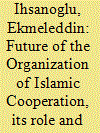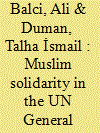|
|
|
Sort Order |
|
|
|
Items / Page
|
|
|
|
|
|
|
| Srl | Item |
| 1 |
ID:
125106


|
|
|
|
|
| Publication |
2013.
|
| Summary/Abstract |
I am deeply pleased and honored to be in this prestigious institution of diplomacy in this wonderful historical mansion, which serves the great tradition of Russian nation and Foreign Office; and I am honored by the presence of many distinguished diplomats, ambassadors, academicians, and public figures.
At the outset, I need to say a few remarks about the developing relationship between the Russian Federation and the OIC, being the Secretary General who has the honor of working for development of official relationship between the Russian Federation and the OIC since 2005. We have reached a very important point where Russia has become very active within the framework of its status as the observer state. We have frequent political consultations; we have developed institutional cooperation regarding political issues. Meanwhile, in economic matters, in financial matters, in cultural matters and in other areas, we have improved relations. Yesterday, there was an agreement between some OIC institutions and economic institutions of this country for expanding the cooperation between the OIC and the Russian Federation. Also the relationships of Tatarstan and Bashkortostan with the OIC institutions, like Islamic Development Bank (IDB), Standards and Metrology Institute for Islamic Countries (SMIIC), Islamic Chamber of Commerce and Industry (ICO), are increasing in such fields as halal food, Islamic banking and the like; and I am really happy with this.
|
|
|
|
|
|
|
|
|
|
|
|
|
|
|
|
| 2 |
ID:
186855


|
|
|
|
|
| Summary/Abstract |
In international politics, governments may tend to favor countries with which they share some degree of cultural affinity. Moreover, international organizations can strengthen solidarity among their members. Not surprisingly, Muslim countries, which came together under the umbrella of the Organization of Islamic Cooperation (OIC), frequently state that they pursue Muslim solidarity in international politics. By looking at voting preferences of OIC member Muslim countries in the UN General Assembly about the selection of nonpermanent UN Security Council members, this article aims to understand Muslim solidarity in international politics. For this, the article uses newspaper reports, political statements, secret intelligence reports, and interviews regarding the votes of Muslim countries in contested elections in which a Muslim country competed with its non-Muslim rival for the same Security Council seat.
|
|
|
|
|
|
|
|
|
|
|
|
|
|
|
|
| 3 |
ID:
182864


|
|
|
|
|
| Summary/Abstract |
Nigeria has the largest Muslim population and economy in terms of gross domestic product in Sub-Saharan Africa. It is a member of the Organization of the Petroleum Exporting Countries and the Organization of Islamic Cooperation among other political, economic, or cultural groupings. Thus, especially in good economic times, Nigeria has a great deal of influence not only on the continent of Africa, but also beyond that geographical region as a middle power. Domestically, Muslims constitute a slight majority in Nigeria’s population with almost all the remainder being Christian. Although Nigeria’s constitution prohibits an official religion, twelve of the country’s thirty-six states (located in the north) follow sharia, or Islamic law. Before Britain’s colonization in the nineteenth century, the northern regions of Nigeria constituted parts of two Sunni Muslim political entities, the Sokoto Caliphate and the Bornu Empire. Although Nigeria’s military and civilian presidents have sometimes acted on their own whims with regard to foreign policy toward the Middle East, in most cases Nigeria’s economic development and internal security have been their overriding concerns. This article addresses Nigeria’s relations with Muslim countries in the Middle East, among them Turkey, Iran, and Saudi Arabia, which are also middle powers. Nigeria, through a balanced approach, has been able to avoid getting involved in Middle Eastern regional squabbles and disputes, while at the same time benefiting from economic investment from countries in that region. Nevertheless, corruption and inefficiency have precluded any real benefit for the vast majority of Nigeria’s population from the revenues derived from the export of hydrocarbons. All the while the country has been affected adversely by the actions of both Sunni and Shi‘i indigenous jihadist groups, which have been inspired at least in part by developments in the Middle East.
|
|
|
|
|
|
|
|
|
|
|
|
|
|
|
|
|
|
|
|
|